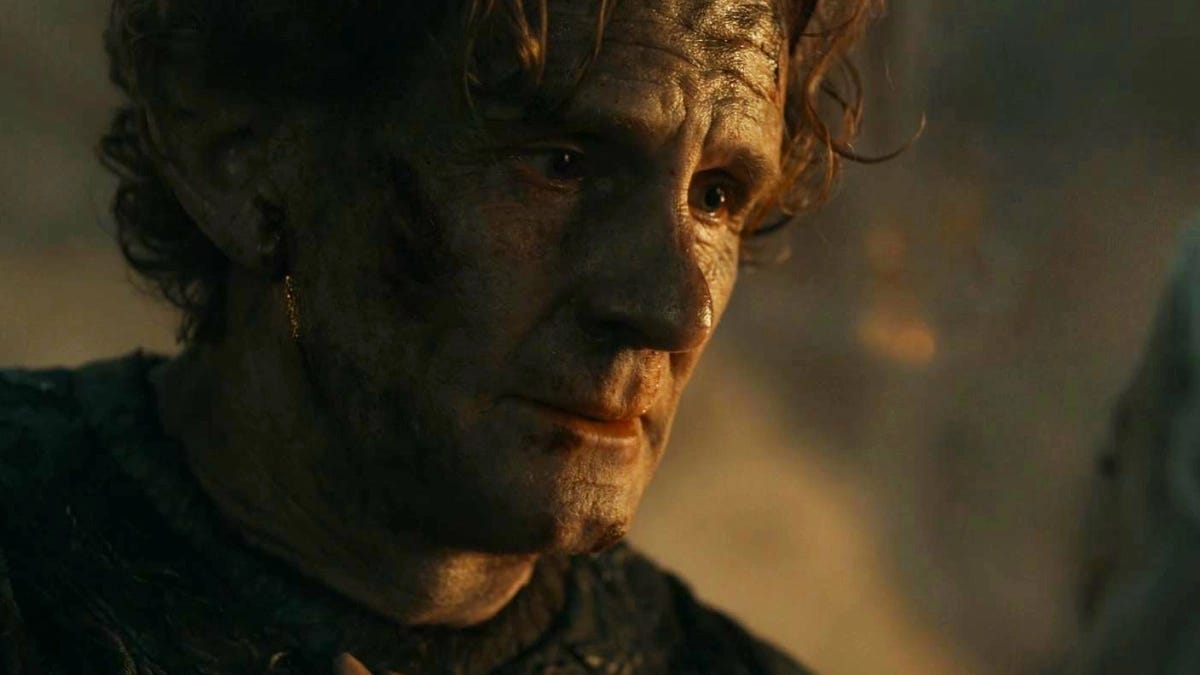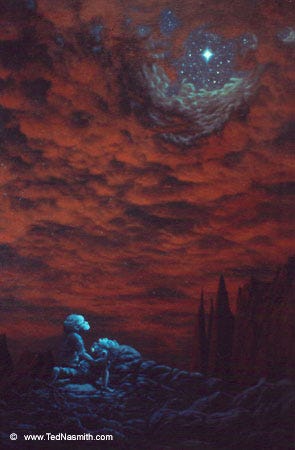With Light
Rings of Power teaches us how to fight the darkness
I’ve been wanting to write something about Rings of Power ever since finishing season 2 back in October, but I could never figure out quite what to say until now. Perhaps I’m still processing the aftermath of the election. Perhaps it’s that Advent is here, the time of the year when we ponder darkness and light. Whatever the case, today I found myself thinking about a scene in season 2’s penultimate episode, “Doomed to Die”
Everything has come apart. Celebrimbor, the greatest elven smith of the age, has woken up to the fact that he has been deceived into making magical rings in partnership with none other than Sauron himself. His city is under siege from orcs. Stumbling out of his tower, he knows the end is near. And this is when he meets Galadriel, making her way through the siege to find him. As Eregion falls around them, Galadriel, who was deceived by Sauron in season 1, laments to Celebrimbor: “I’m sorry I brought him here. I’m sorry I wasn’t stronger.”
Celebrimbor replies:
“Neither of us were strong enough. There might not be anyone in Middle-earth who is. But perhaps the elves need only remember that it is not strength that overcomes darkness, but light. Armies may rise, hearts may fail, yet still light endures, and is mightier than strength. For in its presence all darkness must flee.”
If you are any sort of fan of Tolkien’s works, you know how important light is as a thread within his mythology. One of the Valar, Yavanna, created the two trees of Valinor, Telperion and Laurelin. The Noldor elves, who came to Valinor, beheld the light of the two trees, and grew fair and wise in their light. Fëanor, the greatest craftsman of the Noldor, captured the light of the two trees in the Silmaril jewels, so that even when Morgoth and Ungoliant destroyed the two trees, some form of their light remained. Eärendil the mariner later wore a Silmaril bound on his brow when he sailed to Valinor to seek the aid of the Valar in the war against Morgoth, and later he was sent to sail the heavens with the light of the Silmaril as a star and sign of hope to Middle-earth. Galadriel would later give a phial of this light to Frodo on his journey to Mordor to destroy the One Ring, a phial that Sam would use to save Frodo from Shelob. Celebrimbor’s words on light resonate across Tolkien’s mythology.
Perhaps it seems too fine a point, but it is key that Celebrimbor says light, not strength, must be used to overcome the darkness. Strength is about power, and that is exactly what Sauron has been trying to amass by deceiving Celebrimbor into making magical rings for the different peoples of Middle-earth. Interestingly, it is initially out of a good desire that Sauron is tempted to seek power and strength. Galadriel says at the beginning of season 1, “nothing is evil in the beginning”, and that includes Sauron in Tolkien’s mythology. He wanted to heal Middle-earth and order it. But eventually he began to believe that to do so, he had to have absolute control. Hence, the creation of the Rings of Power and the One Ring itself, which will prove the bane of Middle-earth for thousands of years, and as we know from Lord of the Rings, tempt many others with its power.
Boromir is one such character who is tempted by the power of the Ring. He sees it as “a gift, a gift to the foes of Mordor” upon encountering it in Rivendell. Before trying to take it from Frodo, he says “I only ask for the strength to defend my people”. Boromir has come to the conclusion that strength is the only defense against darkness. He has no use for light. What can light due against the hordes of Mordor? On a certain level it makes eminent sense—when the enemy is at your door, you want a bigger army, a more powerful weapon, to defeat them. But as we know all too well, when your enemies lay defeated around you and the stand unrivaled in the power of your strength, corruption tends to follow.
This of course has everything to say to us today. We live in a climate of escalation, of meeting fire with fire in the cultural and political wars. Fear and anger are the currency of the day. Everything is apocalyptic.
In such a climate, responding with kindness, empathy, grace, and moral character seems weak and pathetic. Turning the other cheek and loving your enemies are deemed “woke”. But are they really? From what I can see, using the Ring of Power exacts a high, high price, one that comes at the cost of your soul. One that takes everything from you and leaves you as a husk of a person.
I’m not saying that choosing the light is easy. It will also cost you something, mainly, being left outside the circles of power. It will probably mean defeat in the short-term. Like Sam Gamgee, we might find ourselves wandering through the smoking pits of Mordor. But like Sam, may we also see and remember:
“There, peeping among the cloud-wrack above a dark tor high up in the mountains… a white star twinkle for a while. The beauty of it smote his heart, as he looked up out of the forsaken land, and hope returned to him. For like a shaft, clear and cold, the thought pierced him that in the end the Shadow was only a small and passing thing: there was light and high beauty for ever beyond its reach.”
I currently write and share this Substack for free, but if you enjoy what you’re reading and would like to drop me a tip, I’d sure be grateful:




